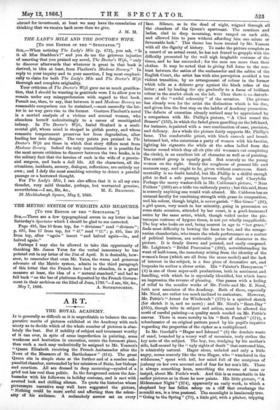THE LADY'S MILE AND THE DOCTOR'S WIFE. [To THE EDITOR
OF THE "SPECTATOR."] Sin,—When noticing The Lady's Mile (p. 472), you ask, "Is it all Miss Braddon's ?" and you do me the grievous injustice of asserting that you praised my novel, The Doctor's Wife, "only to discover afterwards that whatever is great in that book is derived, in idea at least, from Flaubert's Madame Bovary." In reply to your inquiry and to your assertion, I beg most emphati- cally to claim for both The Lady's Mile and The Doctor's Wife thorough and complete originality.
Your criticism of The Doctor's Wife gave me so much gratifica- tion, that I should be wanting in gratitude were I to allow you to remain under any misapprehension with regard to that book. Permit me, then, to say, that between it and Madame Bovary no reasonable comparison can be sustained,—most assuredly the lat- ter in no way gave rise to the former. Gustave Flaubert's novel is a morbid analysis of a vicious and sensual woman, who abandons herself unhesitatingly to a career of unmitigated infamy. In The Doctor's Wife, Isabel Sleaford is a senti- mental girl, whose mind is steeped in girlish poetry, and whose romantic temperament preserves her from degradation, after leading her into danger. The very points you praised in The Doctor's Wife are those in which that story differs most from Madame Bovary. Indeed the only resemblance it is possible for the most severe criticism to discover between the two books, is in the solitary fact that the heroine of each is the wife of a provin- cial surgeon, and leads a dull life. All the characters, all the situations, incidents, scenery, dialogue, reflections, are entirely my own ; and I defy the most searching scrutiny to detect a parallel passage or a borrowed thought.
For The Lady's Mile, I can also affirm that it is all my own thunder, very mild thunder, perhaps, but warranted genuine,






























 Previous page
Previous page